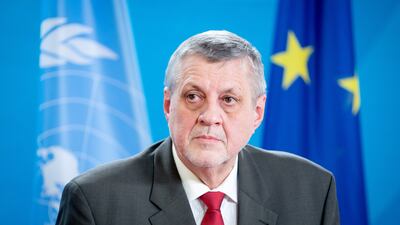In his swan song to Libyans, UN envoy Jan Kubis has urged voters in upcoming elections to choose the candidate that will bring unity and justice to a country marred by a decade of chaos and insecurity.
Mr Kubis steps down as UN envoy to Libya this week after less than a year on the job and before a key presidential vote on December 24 that has faced fierce legal rows and an ever-expanding pool of candidates.
The UN envoy’s departure and divisions in the UN Security Council over appointing a successor have strained an already ailing effort to restore peace and stability to the turbulent North African country.
“I appeal to all Libyans to go and vote for candidates that can guarantee unity, stability and sovereignty based on national reconciliation, justice, accountability, democracy, rule of law and good governance,” Mr Kubis said on Wednesday.
The vote is a chance for Libyans to turn the page on “division, disunity, paralysis and dysfunctional institutions” and free it from the grip of “foreign interference”, added the Slovak diplomat.
Mr Kubis said he was leaving for "professional and personal reasons". The envoy, who has been based in Geneva, previously said the job should be carried out by somebody based in Libya’s capital Tripoli, and that he resigned to “to create conditions for this”.
Dozens of candidates have put their names forward, including Saif Al Islam Qaddafi — son of the country’s former leader and wanted by the International Criminal Court — and Field Marshal Khalifa Haftar, leader of the eastern-based Libyan National Army who is being sued in the US over civilian deaths.
Other hopefuls include Aref Nayed, a former Libyan ambassador to the UAE, businessman and head of the liberal Ihya Libya party, former interior minister Fathi Bashaghaf, and interim Prime Minister Abdul Hamid Dbeibah.
Libya's electoral commission has not yet released a final list of candidates for the race following a fractious process of court appeals over the eligibility of the 98 who have registered to run.
The rows exposed deep differences over the basis for an electoral process that has already diverged from the election road map backed by the UN and major world powers.
The road map envisaged the election as a way to forge consensus over the legitimacy of Libya's rival political bodies, which emerged amid the chaotic fallout of the 2011 revolution that toppled dictator Muammar Qaddafi.
Libya’s High Council of State on Wednesday called for the presidential election to be delayed until February amid growing jostling over the rules and the legal basis of a vote.
The council's advisory body was installed through a 2015 peace agreement. The extent of its powers has been a cause for debate and it is not recognised by all the entities in Libya's complex, fractured political environment.
UN Secretary General Antonio Guterres on Monday appointed US diplomat Stephanie Williams to lead mediation efforts in Libya after Mr Kubis's departure. She was, however, named a special adviser, not an envoy — a designation that did not require approval from the divided Security Council.


